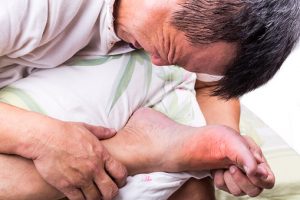 Gout may sound strange, and many people don’t know what it is. Despite its relative unfamiliarity, gout is on the rise, according to Dr. Clare Ballingall. This is mainly attributed to increased rates of obesity, but there are cases of individuals being genetically predisposed to the ailment.
Gout may sound strange, and many people don’t know what it is. Despite its relative unfamiliarity, gout is on the rise, according to Dr. Clare Ballingall. This is mainly attributed to increased rates of obesity, but there are cases of individuals being genetically predisposed to the ailment.
Gout is a complex form of arthritis and can affect anyone. Men are typically the ones getting diagnosed with gout but postmenopausal women are especially susceptible. It is thought that female hormones play some role in the prevention of gout, which would explain why its seen after menopause. A gout attack can occur suddenly, commonly in the big toe. It may present as a sudden pain in the joint, with it feeling hot and swollen. The affected joint may also be so tender that even the weight of your bed sheet can be intolerable.
Advertisement
“We are seeing more of it—1.5 percent of the population has gout as we speak and that increases to over 10 percent in the elderly. It’s one of the most common joint disorders in the world and is more common in men—we think female sex hormones are protective,” says Dr. Ballingall.
Gout occurs due to the accumulation of urate crystals in the joint, causing inflammation and intense pain. These crystals can form when you have high uric acid in the blood. Your body innately produces uric acid when it breaks down purines—substances that are found naturally in the body as well as in certain foods such as steak, organ meats, and seafood. Other foods that promote higher levels of uric acid include alcoholic beverages and drinks sweetened with fructose.
“Historically, gout was called the disease of kings because it occurred in people who had very rich diets and drank alcohol—mainly beer,” Dr. Ballingall says.
In a normal individual that is without gout, uric acid dissolves in the blood and passes through the kidneys to be expelled in the urine. But sometimes the body produces too much uric acid, or the kidneys excrete too little of it. When this happens, uric acid can build up and form sharp, needle-like urate crystals in a joint or surrounding tissue that causes pain, inflammation, and swelling.
If improperly treated, gout can develop into more severe conditions. Recurrent gout is when a person experiences gout attacks several times a year, and if left untreated, it can cause erosion and destruction of a joint. Advanced gout occurs when deposits of urate crystals form under the skin in nodules called tophi, which develop in several areas such as the fingers, hands, feet, elbows, or Achilles tendons. Tophi usually aren’t painful, but they become swollen and tender during attacks. Lastly, gout can turn into kidney stones as a result of urate crystals in the urinary tract.
“If you are getting repeated attacks, you probably need to be on some medication to stop the attacks. There is gout-related kidney disease and gout-related kidney stones that can result, so always see a GP,” said Dr. Ballingall.
Related: 14 Natural remedies for gout pain relief
